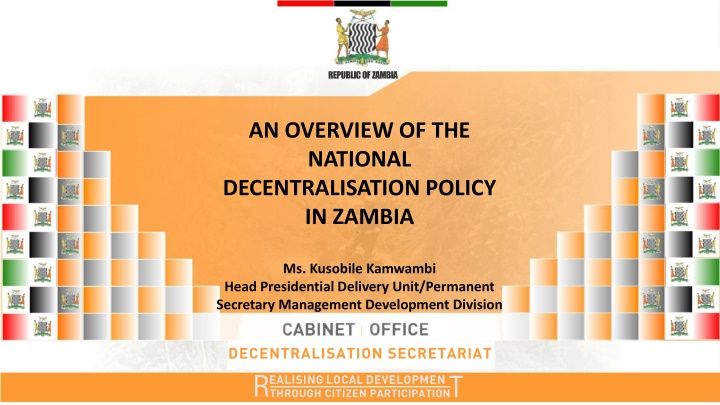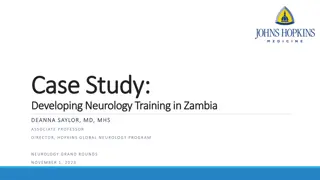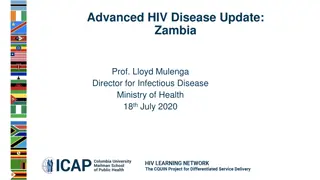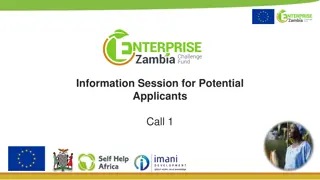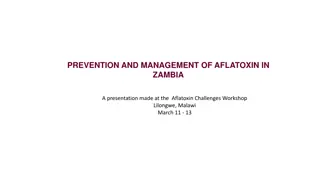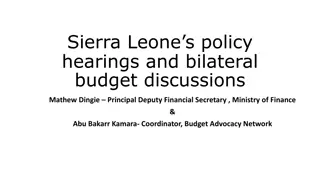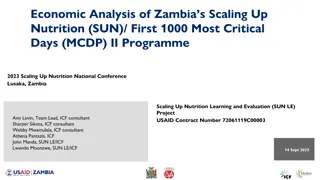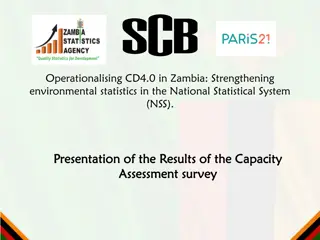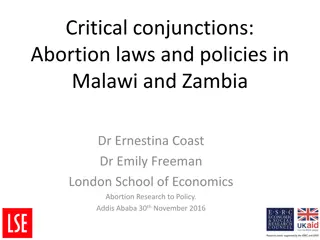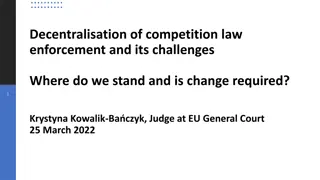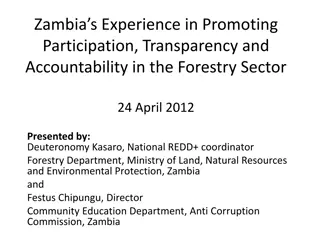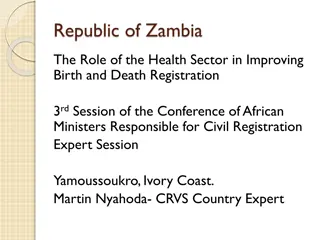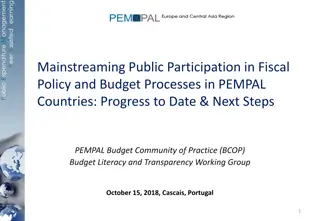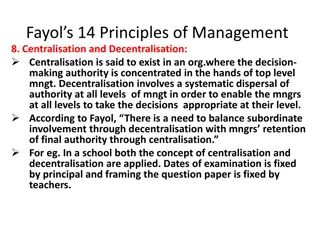Decentralisation Policy in Zambia: Enhancing Local Development Through Citizen Participation
The National Decentralisation Policy in Zambia, approved in 2002 and revised in 2016 and 2023, focuses on achieving sustainable development and improved service delivery through citizen engagement. Rooted in the belief that community involvement is crucial for socio-economic progress, the policy outlines key principles such as good governance, equity, and inclusiveness to guide the devolved governance system. It emphasizes collaborative decision-making, aligning with the national constitution, and promoting environmentally conscious growth for sustainable local development.
Download Presentation

Please find below an Image/Link to download the presentation.
The content on the website is provided AS IS for your information and personal use only. It may not be sold, licensed, or shared on other websites without obtaining consent from the author.If you encounter any issues during the download, it is possible that the publisher has removed the file from their server.
You are allowed to download the files provided on this website for personal or commercial use, subject to the condition that they are used lawfully. All files are the property of their respective owners.
The content on the website is provided AS IS for your information and personal use only. It may not be sold, licensed, or shared on other websites without obtaining consent from the author.
E N D
Presentation Transcript
REPUBLICOFZAMBIA AN OVERVIEW OF THE NATIONAL DECENTRALISATION POLICY IN ZAMBIA Ms. Kusobile Kamwambi Head Presidential Delivery Unit/Permanent Secretary Management Development Division DECENTRALISATION SECRETARIAT R THROUGH CITIZEN PARTICIPATIONT EALISING LOCAL DEVELOPMEN
DECENTRALISATION SECRETARIAT R T EALISING LOCAL DEVELOPMEN THROUGH CITIZEN PARTICIPATION INTRODUCTION The National Decentralisation Policy in Zambia was first approved in 2002, revised in 2016 and recently in 2023. The Policy is a strategic framework that aims to achieve citizen participation in sustainable development and enhance service delivery through decentralization. Let s delve into the key aspects of this policy: Vision and Rationale: The vision of the Policy is to realize local development through citizen participation within a unitary state for sustainable growth. The rationale is rooted in the conviction that community engagement and local governance are cardinal for Zambia s socio-economic transformation. DECENTRALISATION SECRETARIAT REALISING LOCAL DEVELOPMENT . THROUGH CITIZEN PARTICIPATION
Pronouncements by Mr. Hakainde Hichilema, President of the Republic of Zambia
Defines the Scope for a devolved system of governance in a Unitary State Establishes unding mechanisms for functions at sub-national level Outlines the Principles of the devolved governance system The Constitution of Zambia Assigns responsibility to the national Government to ensure adequate resources at the sub-national structures Prescribes the functions National, Provincial and Local Authorities
DECENTRALISATION SECRETARIAT R T EALISING LOCAL DEVELOPMEN THROUGH CITIZEN PARTICIPATION GUIDING PRINCIPLES OF THE POLICY I. Good Governance: Ensuring transparent, accountable, and effective governance. II. Equity: Promoting fairness and equal opportunities. III. Subsidiarity: Decisions made at the most appropriate level. IV. Constitutional Jurisdiction: Aligning with the national constitution. V. Cooperative Governance: Collaboration among different levels of government. VI. Sustainable Local Development: Fostering environmentally conscious growth. VII.Inclusiveness: Ensuring everyone s voice is heard. DECENTRALISATION SECRETARIAT REALISING LOCAL DEVELOPMENT . THROUGH CITIZEN PARTICIPATION
Scope of the 2023 Revised National Decentralisation Policy Administrative Decentralisation Decentralised Governance Fiscal Decentralisation
DECENTRALISATION SECRETARIAT R T EALISING LOCAL DEVELOPMEN THROUGH CITIZEN PARTICIPATION DECENTRALISEDGOVERNANCE PROGRESS Elected Councils Objective: Promote inclusive citizen and community participation in democratic governance at the local level. Ward Development Committees and Constituency Development Fund(CDF) Committees Country-wide District and Provincial Development Coordinating Committee are functional Measures: Strengthen platforms for community engagement. Constituency Development Fund enhanced from K1.6 million to K30.6 million per Constituency. Build capacities of provinces, districts, local authorities, and wards in community engagement, development planning, and service delivery coordination. Approvals and treasury authority on CDF Components decentralised to the Province and Local Authorities CDF Monitoring Dashboard developed DECENTRALISATION SECRETARIAT REALISING LOCAL DEVELOPMENT . THROUGH CITIZEN PARTICIPATION
DECENTRALISATION SECRETARIAT R ADMINISTRATIVE DECENTRALISATION Transfer of Functions to Sub-national level: Transfer decision-making authority. Enhance efficiency in the delivery and access to public services. T EALISING LOCAL DEVELOPMEN THROUGH CITIZEN PARTICIPATION PROGRESS Sector Devolution Plans developed. Cabinet Office Circular No2 of 2023 provides devolution guidelines Eight (8) functions and Budgets have been transferred to local authorities. Human Resources Management Committees established in LAs and Province Administration. Local Authority Organisation Structure have been reviewed. Public Service Unions have been engaged. Countrywide employee sensitisation undertaken Close to 36,000 Civil Servants have been attached to Local Authorities. Human Resource Management policies and proceedures in updated. 41 Integrated Development Plans have been launched Human Resource Management Reforms: Re-align organisational structures. Promote change management. Participatory Development Planning: Foster inclusive, sustainable, and climate- resilient local development. Promote inclusive formulation and implementation of development plans. Explore public-private partnerships. DECENTRALISATION SECRETARIAT REALISING LOCAL DEVELOPMENT . THROUGH CITIZEN PARTICIPATION
DECENTRALISATION SECRETARIAT R FISCAL DECENTRALISATION T EALISING LOCAL DEVELOPMEN THROUGH CITIZEN PARTICIPATION PROGRESS Budgets for devolved functions have been transferred to Local Authorities in 2024 Treasury Guidelines to Local Authorities on devolved functions have issued by the Ministry of Finance Accounting Manuals for Local Authorities to harmonise accounting system Inter-Governmental Fiscal Architecture is under review to facilitate implementation of fiscal decentralisation Zambia Devolution Support Prgramme being implemented to strengthen capacities in Town Councils Local Financial Capacities and Financial Management and Accountability: Strengthen financial resource sharing mechanisms. Strengthen capacities to mobilize own-source revenue Review and implement the framework for inter-governmental transfers Prudent Financial Management and Accountability: Strengthen financial management and accounting. Harmonise accounting policies, practices and systems. Strengthen capacity of Local Authority in debt management. DECENTRALISATION SECRETARIAT REALISING LOCAL DEVELOPMENT . THROUGH CITIZEN PARTICIPATION
PHASE 1 (2023) PHASE 1 (2023) PHASE 1 (2023) PHASE 1 (2023) Transfer of exclusive functions to Local Authorities Transfer of exclusive functions to Local Authorities PHASE 2 (2024 PHASE 2 (2024- -2025) PHASE 2 (2024 PHASE 2 (2024- -2025) 2025) 2025) Capacity Development Capacity and Systems Strengthening Change Management Change Management Expanding Revenue base of Local Authorities Expanding Revenue base of Local Authorities PHASE 3 (2026 PHASE 3 (2026- -2027) PHASE 3 (2026 PHASE 3 (2026- -2027) 2027) 2027) Consolidation of gains of the past years of decentralisation implementation informed by the mid-term evaluation mid-term evaluation Consolidation of gains of the past years of decentralisation implementation informed by the
Implementation Framework District Administration Provincial Administration National Government Traditional Leaders Academia and Research Community Ward Development Committee Trade Unions Local Authorities Civil Society Constituency Development Committee Legislature Cooperating and Implementing Partners
DECENTRALISATION SECRETARIAT R T EALISING LOCAL DEVELOPMEN THROUGH CITIZEN PARTICIPATION CONCLUSION We will make decentralisation work by empowering communities, improving service delivery, and promoting sustainable local development through growing the economy, creating jobs and support businesses. DECENTRALISATION SECRETARIAT REALISING LOCAL DEVELOPMENT . THROUGH CITIZEN PARTICIPATION
